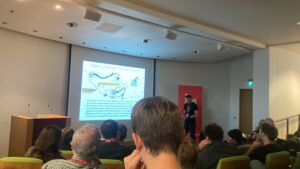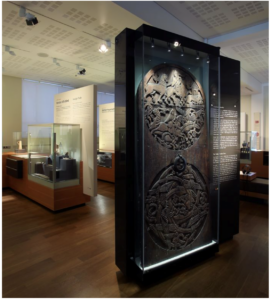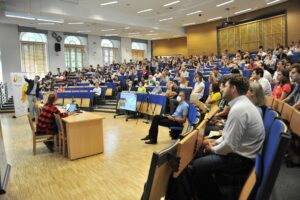- On May 16th 2023 Dr. Wojciech Brzezicki delivered a popular science lecture „Obwarzanki z elektronów” within a „Bliżej Nauki” („Closer to science”) series at the Jagiellonian University in Kraków. The recorded lecture can be found at www.youtube.com/watch?v=Kv5YJBSvY5M
- On May 1 st, 2023 Prof. Tomasz Dietl delivered a lecture on „New computer architectures” for gifted high school students gathered at a scientific camp organized yearly by the Polish Children’s Fund in Falenty near Warsaw.
- „Focused Expert Meeting on Interfacing Magnetism and Superconductivity with Topological Matter” organized by MagTop took place in Warsaw on 17 and 18 January 2023. The event was joint with a yearly meeting of the International Scientific Committee (ISC) that supervises MagTop activities and helps to implement research and organizational good practices. The ISC is chaired by Laurens Molenkamp and consists now of ten members, eight of whom attended the Meeting and delivered the lectures.
Seventy participants from nine countries plus several tens of IFPAN researchers attended the “Focused Expert Meeting”, its invited lectures, a round table discussion, poster session, and a guided tour over MagTop laboratories.
The lectures were delivered by:
- Ana Akrap: „Landau-level spectroscopy of topological semimetals”
- Kamran Behnia: „Anomalous Nernst and thermal Hall effects in topological magnets”
- Annica Black-Schaffer: „Majorana fermions in nanowire systems”
- Sergey Borisenko: „Towards the topological superconductivity using ARPES”

- Wojciech Brzezicki: „Topological effects in layered semiconductors and nanowires”
- Hartmut Buhmann: „HgTe – Transport in Topological Material”
- Mario Cuoco: „Superconducting orbitronics effects”
- Giuseppe Cuono: „Accurate description of topological properties by density functional theory”
- Piotr Deuar: „Overlaps of the ultracold atom field with condensed matter and topological physics”
- Tomasz Dietl: „Spin phenomena in magnetic and non-magnetic topological insulators”
- Tadeusz Domański: „Topological superconductivity and boundary modes of magnetic nanostructures”
- Arthur Ernst: „Impurities, defects and other imperfections in topological insulators: first-principles perspectives”
- Sergey Frolov: „No, you haven’t discovered a Majorana Fermion”
- Olena Gomonay: „Magnetic excitations in antiferromagnets: electrical and optical excitation and long-distance transport of spin”
- Izabella Grzegory: „High pressure as a tool in topological matter related physics and technology”
- Dariusz Kaczorowski: „On the hunt for topological superconductors”
- Aleksandr Kazakov: „Topological materials based on IV-VI semiconductors and Tin”
- Alexander Lau: „Designing three-dimensional flat bands in nodal-line semimetals”
- Marcin Matusiak: „Heat transport in Weyl semimetals”
- Laurens Molenkamp: „Making sense of the quantum anomalous Hall effect”
- Milan Orlita: „Magneto-optics of topological materials”
- Carmine Ortix: „Designing spin and orbital sources of Berry curvature at oxide interfaces”
- Mircea Trif: „Quantum computing with magnetic impurities in superconductors”
- Jakub Zázvorka: „Skyrmion Diffusion in Continuous Films”
The round table discussion, chaired by Tomasz Dietl, was focused on the future prospects and technological applications of the topological condensed matter. Artur Kębłowski , R&D Director of Vigo Photonics, was one of the panelists. The full event program can be found on the website: http://magtop.flyhigh.pro/magtop-meeting-2023/ . 23 posters were presented by Ph.D. students and postdocs of MagTop and members of other IFPAN departments. The Ph.D. students and postdocs had a chance to interact and discuss with invited professors and experts. Overall, the event allowed the MagTop community to disseminate their accomplishments, to learn about most recent developments, to get new ideas, and to arrange new scientific collaborations.
MagTop’s employees Carmine Autieri, Aleksandr Kazakov, Marcin Wysokiński, and Alexander Lau were Chairs of Meeting; MagTop’s PIs, Tomasz Dietl and Tomasz Wojtowicz, together with Carmine Autieri, were responsible for the Program. As a part of soft skill training, the local organizing committee was composed of MagTop Ph.D. students and young postdocs. Actually, virtually all MagTop members were involved: as organizers, speakers, session chairs, poster presenters, and guides of the laboratory tours, as indicated at http://magtop.flyhigh.pro/magtop-meeting-2023/ .
The event was supported by MagTop and the Institute of Physics of the Polish Academy of Sciences (IFPAN) and held in IFPAN’s Leonard Sosnowski Auditorium. The conference dinner was organized in Restauracja Papu, which serves traditional Polish cuisine.
- MagTop leader Mircea Trif, along with Dr. Thore Posske (University of Hamburg) and Prof. Benedetta Flebus (Boston College), was a member of the Organizing Committee of the Northern Lights Conference, which took place in Reykjavik during 12-15 October, 2022. It was an international physics conference hosted by the Next Generation Partnership Network of the Universität Hamburg (Mircea Trif/MagTop is a member of the network). Its focus was on the interplay of (quantum) magnetism, topology, and superconductivity, as well as on novel applications to tomorrow’s quantum technologies. Besides being at the forefront of current scientific research, these topics are also at the core of the MagTop research agenda.
The conference benefitted greatly from the support of the local co-organizers Sigurður Ingi Erlingsson (Reykjavík University), Andrei Manolescu (Reykjavík University), and Viðar Guðmundsson (University of Iceland). It was also partly supported by NCN, through the OPUS grant program (Mircea Trif). The Northern Light Conference was fully in-person, and gathered ~70 participants, among which 32 were invited speakers from Europe, US, and China. A hallmark of the Northern Lights Conference was its demographics: it consisted mostly of young and very prolific physicists, with a balanced ratio between men and female scientists. Among the many invited speakers, a few representative names covering both theoretical and experimental works were: 
- Ronald Wiesendanger, University of Hamburg: Bottom-Up Design of Topological Superconductors
- Yaroslav Tserkovnyak (photo), University of California, Los Angeles: Novel transport and probes of quantum materials based on topological spin textures
- Javad Shabani, New York University, USA: Making Sense of the Quantum Anomalous Hall Effect
- Pascal Simon, University of Paris-Saclay, France: New insights from electronic transport in superconducting bound-states
- Jelena Klinovaja, University of Basel, Switzerland: Superconducting diode effect due to magnetochiral anisotropy in topological insulator and Rashba nanowires
- Xiaoqin Elaine Li, University of Texas, Austin, USA: Magnons in topological materials
The full conference program can be found on the website: https://www.northernlightsconference22.eu/. Many junior scientists (PhDs and postdocs) showcased their results during a lively poster session. Furthermore, each poster presenter had been given the opportunity to pitch their poster in a 3 minutes oral talk during one of the invited sessions. A selected few, among which were the MagTop members Dr. Alexander Lau and Dr. Archana Mishra, have shared their results in contributed talks.
 The conference was held in the conference room of the National Museum of Iceland, Reykjavík (photo), providing an environment conducive to interactions and scientific discussions. Moreover, it offered a great opportunity to combine cutting-edge science with cultural exposure: throughout the conference, all participants were offered free access to the museum to learn first hand about the history of Iceland. The conference banquet was held at the Matarkjallarinn Food Cellar in the heart of Reykjavík. The social program also included a half a day excursion to Þingvellir National Park, the scenic Gullfoss waterfall, and the geothermal area in Haukadalur (the “Golden Circle”). Overall, the feedback from the participants was overwhelmingly positive and, since Next Generation Partnership Network of the Universität Hamburg will continue throughout 2023, we hope the Northern Lights Conference will become a series of conferences in the future.
The conference was held in the conference room of the National Museum of Iceland, Reykjavík (photo), providing an environment conducive to interactions and scientific discussions. Moreover, it offered a great opportunity to combine cutting-edge science with cultural exposure: throughout the conference, all participants were offered free access to the museum to learn first hand about the history of Iceland. The conference banquet was held at the Matarkjallarinn Food Cellar in the heart of Reykjavík. The social program also included a half a day excursion to Þingvellir National Park, the scenic Gullfoss waterfall, and the geothermal area in Haukadalur (the “Golden Circle”). Overall, the feedback from the participants was overwhelmingly positive and, since Next Generation Partnership Network of the Universität Hamburg will continue throughout 2023, we hope the Northern Lights Conference will become a series of conferences in the future.
- Within competition “Fizyczne Ścieżki” (Physical paths) for primary- and high-school one of the laureate, Dawid Bugajewski, was awarded with a one-week (5-9.09.2022) workshop at MagTop under Prof. Tomasz Dietl supervision. During this workshops Dawid had the opportunity to familiarize himself with the methodology of scientific work. He expanded his knowledge of semiconductors, numerical methods used in physics, and also learned an issues related to topological matter. As Dawid said at the end of the internship, he became very interested in this branch of physics. Before the internship, Dawid was asked by Prof. Dietl to solve the problem concerning the density function of quasiparticle states. By e-mail, he replied to the questions asked by supervisor. During his stay at the MagTop, he had the opportunity to see several experimental laboratories and learn more about the idea of topological matter. He dealt with numerical codes (Mathematica program) used to determine the eigenstates of acceptor impurities in certain semiconductors. The calculations started during the internship, Dawid continues after returning home.
- MagTop employees: Andrzej Wiśniewski, Marcin Wysokiński and Przemysław Iwanowski were members of the Organizing Committee of the conference The Joint European Magnetic Symposia (JEMS2022), which took place in Warsaw from 24 to 29 July 2022. JEMS is one of the largest conferences in the field of magnetism, and its 2022 edition
 was organized jointly by the Institute of Physics of the Polish Academy of Sciences and the Faculty of Physics of the University of Warsaw with a technical support of the Nobell Congressing company. JEMS conferences are held under the patronage of the European Magnetism Association (EMA). The conference in Warsaw, JEMS2022, was additionally held under the patronage of the Rector of the University of Warsaw, Prof. Alojzy Nowak. The chair of the Organizing Committee was Andrzej Wiśniewski (MagTop, Institute of Physics of the Polish Academy of Sciences), co-chairman was Andrzej Twardowski (Faculty of Physics, University of Warsaw). The chair of the Program Committee was Maciej Sawicki (Institute of Physics of the Polish Academy of Sciences), co-chairman Diana C. Leitão (Eindhoven University of Technology, Netherlands). The full list of the committees is available on the website: https://jems2022.pl/. The sponsors of the conference were: US Army (Army Research Office), Evico Magnetics, Qnami and Quantum Design (three companies had their stands at the Conference). The JEMS2022 conference was hybrid. 633 participants from 42 countries took part in it; 447 came to Warsaw, 186 participated remotely. Due to Russia’s aggression against Ukraine, by the decision of the organizers and the EMA, participants affiliated with Russian and Belarusian scientific institutions could not participate in the conference. Eleven participants from Ukraine were exempted from the conference fees, some of them came to Warsaw, some of them attended online. JEMS2022 consisted of 18 thematic symposia, 5 plenary and 10 semi-plenary lectures, 83 invited lectures and 349 oral presentations; 150 posters were presented in remote sessions. Plenary lectures were delivered by:
was organized jointly by the Institute of Physics of the Polish Academy of Sciences and the Faculty of Physics of the University of Warsaw with a technical support of the Nobell Congressing company. JEMS conferences are held under the patronage of the European Magnetism Association (EMA). The conference in Warsaw, JEMS2022, was additionally held under the patronage of the Rector of the University of Warsaw, Prof. Alojzy Nowak. The chair of the Organizing Committee was Andrzej Wiśniewski (MagTop, Institute of Physics of the Polish Academy of Sciences), co-chairman was Andrzej Twardowski (Faculty of Physics, University of Warsaw). The chair of the Program Committee was Maciej Sawicki (Institute of Physics of the Polish Academy of Sciences), co-chairman Diana C. Leitão (Eindhoven University of Technology, Netherlands). The full list of the committees is available on the website: https://jems2022.pl/. The sponsors of the conference were: US Army (Army Research Office), Evico Magnetics, Qnami and Quantum Design (three companies had their stands at the Conference). The JEMS2022 conference was hybrid. 633 participants from 42 countries took part in it; 447 came to Warsaw, 186 participated remotely. Due to Russia’s aggression against Ukraine, by the decision of the organizers and the EMA, participants affiliated with Russian and Belarusian scientific institutions could not participate in the conference. Eleven participants from Ukraine were exempted from the conference fees, some of them came to Warsaw, some of them attended online. JEMS2022 consisted of 18 thematic symposia, 5 plenary and 10 semi-plenary lectures, 83 invited lectures and 349 oral presentations; 150 posters were presented in remote sessions. Plenary lectures were delivered by:
-Geoffrey Beach (Massachusetts Institute of Technology, USA): Domain Walls and Skyrmions: From Ferromagnets to Ferrimagnets,
-Felix Casanova (CIC nanoGUNE, Spain): Spin-orbit proximity in van der Waals heterostructures for logic devices,
-Nora Dempsey (University of Grenoble Alpes – Institut Néel, France): Hard magnetic: from material studies to micro-system application, https://jems2022.pl/
-Mathias Kläui (University of Mainz, Germany): From Spin-Orbitronics to Orbitronics – novel science and applications in memory & non-conventional computing,
-Laurens Molenkamp (University of Würzburg, Germany): Making Sense of the Quantum Anomalous Hall Effect.
The full conference program can be found on the website: https://jems2022.pl/. Poster presentations took place only in a remote form. Within individual sessions, each person presenting the poster had 2 minutes to briefly present the most important results. Then presenters and session participants could connect to individual „rooms” where the results were discussed in detail. A memorial session was organized as part of the conference. These were pre-recorded lectures on the recently deceased outstanding foreign physicists in the field of magnetism: Igor E. Dzyaloshinski, John Slonczewski and Polish: Marek Cieplak, Ludwik Dobrzyński, Robert Gałązka, Roman Micnas, Janusz Morkowski, Wojciech Suski and Włodzimierz Zawadzki. The lectures are available on the conference website: https://jems2022.pl/memorial-lectures. The conference was held at the university campus at Krakowskie Przedmieście (rooms in the Auditorium Maximum and the Old Library of the University of Warsaw). The three previous JEMS conferences (Glasgow, Mainz and Uppsala) have been held at commercial conference centers. The campus and its immediate surroundings were a great showcase of the University and Warsaw, and provided an atmosphere conducive to discussions and scientific discussions. The authorities of the European Magnetism Association, the organization under the auspices of which JEMS conferences are organized, have even decided to recommend that, if possible, subsequent JEMS conferences should be held at universities. The conference banquet was held in Arkady Kubicki (part of the Royal Castle in Warsaw). Participants had the opportunity to reach the Arcades through the Castle courtyard, the hall and the upper garden. Naturally, the place of the banquet prompted explanations related to the history of the Castle, in particular its fate during the war and its subsequent reconstruction. Many guests were interested in this.
The next JEMS2023 conference will be held in Madrid, its organizers have declared that they want to use many solutions that were introduced at the Warsaw conference.
- Dr. Marcin Płodzień was a guest in devmentor.pl podcast where he was talking about Quantum Computers: its fundamentals, difficulties in building general-purpose quantum computers, its potential applications, and nearest perspectives (in Polish) https://www.youtube.com/watch?v=cbMw28U2Chs&t=1s)
- Prof. Tomasz Dietl gave an interview for the weekly Polityka „Technologie, które zmienią świat”
- Prof. Tomasz Dietl delivered a talk „Nanospitronika i materia topologiczna” for public at large in the TVIATVN channel.
- Dr. Marcin Wysokiński in the Winter semester 2018/2019 and 2020/2021 was lecturing a 30 hours course on «Condensed Matter Theory» for PhD students.
- Within the program „Polish Children’s Fund” drs Wojciech Brzezicki and Timo Hyart took a part in one-week workshop for high-school students organized by IF PAN (https://fundusz.org/warsztaty-badawcze-insytut-fizyki-pan-warszawie-styczen/). During period 21-25.01.2019 there were supervising a student Jakub Pilimon working in the field of topological states of quantum matter. He was introduced to the concept of variational formulation of classical mechanics and then to the basic concepts of quantum mechanics. Next, Jakub learned about the simplest topological invariants by studying the canonical models originating from the condensed matter systems, namely Su-Schrieffer-Hegger and Bernevig-Hughes-Zhang models. This involved calculation of the invariants and verifying bulk-boundary correspondence by a numerical approach. At the end of the workshop Jakub prepared and presented a talk about his work in front of all participants and tutors.
The collaboration with Jakub Pilimon was then continued in the direction of topological states of the non-Hermitian systems with a focus on non-Hermitian extension of the Bernevig-Hughes-Zhang model. A monthly internship for Jakub was held in MagTop on 1-31.07. 2019, in agreement with the Polish Children’s Fund. Due to age restrictions of the Polish Children’s Fund Jakub worked with us via remote in the period 1-28.07.2019 and then he visited MagTop on 29-31.07.2019 for the discussions. The collaboration on the project is still active and on the stage of writing first draft of a scientific paper that we plan to submit to Physical Review B journal.
- Within the program Polish Children’s Fund Dr. Marcin Płodzień took a part in one-week workshop for high-school students organized by IF PAN. During period 21-25.01.2019 he was supervising two students Kamil Iwanowski and Katarzyna Dylewska working in the field of classical chaotic systems. They were introduced to the basics concepts of classical mechanics in Lagrangian formulation. Variational principle and Eulere-Lagrange equations. Next, they were introduced to notion of classical chaotic systems with focus on two examples: Lorentz attractor and double-pendulum. During the workshop they went through wheather forecasting model of Lorentz and prepare standard analytical calculations of equation of motions for double-pendulum model and write numerical codes (both in Python and Octave) to simulate dynamics of double-pendulum. They prepared analytical analysis of stable solutions and numerically studied chaotic behavior calculating Poincare map. At the end of the workshops students prepared presentation which was presented to all participants and tutors during last-day mini-symposium. See more: https://fundusz.org/aktualnosci/obozy-i-warsztaty/warsztaty-badawcze-w-if-pan/
- Within competition „Physical paths 2019” for primary- and high-school one of the laureate, Mikołaj Myszkowski, was awarded with one-week (23-27.09.2019) workshops at IF PAN under Dr. Marcin Płodzień and Prof. Andrzej Wiśniewski supervision. During this workshops Mikołaj was working in the topic of ultra-cold many body systems. Mikołaj was investigating energy level structure of the single-particle problem in an anharmonic trap. He was introduced to methods of numerical solution of single-particle eigenproblems in generalized potential. In particular he analyzed energies of the anharmonic trap as a function of anharmonicity parameter. Next, he was introduced to many-body description of ultra-cold bosons confined in a one-dimensional harmonic trap in the language of second-quantization.
- Dr. Marcin Płodzień and Prof. Mariusz Gajda from IF PAN ON5 in the Summer semester 2019/2020 were lecturing a 30 hours course on «Ultracold Quantum Gases» for PhD students.


 The conference was held in the conference room of the National Museum of Iceland, Reykjavík (photo), providing an environment conducive to interactions and scientific discussions. Moreover, it offered a great opportunity to combine cutting-edge science with cultural exposure: throughout the conference, all participants were offered free access to the museum to learn first hand about the history of Iceland. The conference banquet was held at the Matarkjallarinn Food Cellar in the heart of Reykjavík. The social program also included a half a day excursion to Þingvellir National Park, the scenic Gullfoss waterfall, and the geothermal area in Haukadalur (the “Golden Circle”). Overall, the feedback from the participants was overwhelmingly positive and, since Next Generation Partnership Network of the Universität Hamburg will continue throughout 2023, we hope the Northern Lights Conference will become a series of conferences in the future.
The conference was held in the conference room of the National Museum of Iceland, Reykjavík (photo), providing an environment conducive to interactions and scientific discussions. Moreover, it offered a great opportunity to combine cutting-edge science with cultural exposure: throughout the conference, all participants were offered free access to the museum to learn first hand about the history of Iceland. The conference banquet was held at the Matarkjallarinn Food Cellar in the heart of Reykjavík. The social program also included a half a day excursion to Þingvellir National Park, the scenic Gullfoss waterfall, and the geothermal area in Haukadalur (the “Golden Circle”). Overall, the feedback from the participants was overwhelmingly positive and, since Next Generation Partnership Network of the Universität Hamburg will continue throughout 2023, we hope the Northern Lights Conference will become a series of conferences in the future. was organized jointly by the Institute of Physics of the Polish Academy of Sciences and the Faculty of Physics of the University of Warsaw with a technical support of the Nobell Congressing company. JEMS conferences are held under the patronage of the European Magnetism Association (EMA). The conference in Warsaw, JEMS2022, was additionally held under the patronage of the Rector of the University of Warsaw, Prof. Alojzy Nowak. The chair of the Organizing Committee was Andrzej Wiśniewski (MagTop, Institute of Physics of the Polish Academy of Sciences), co-chairman was Andrzej Twardowski (Faculty of Physics, University of Warsaw). The chair of the Program Committee was Maciej Sawicki (Institute of Physics of the Polish Academy of Sciences), co-chairman Diana C. Leitão (Eindhoven University of Technology, Netherlands). The full list of the committees is available on the website: https://jems2022.pl/. The sponsors of the conference were: US Army (Army Research Office), Evico Magnetics, Qnami and Quantum Design (three companies had their stands at the Conference). The JEMS2022 conference was hybrid. 633 participants from 42 countries took part in it; 447 came to Warsaw, 186 participated remotely. Due to Russia’s aggression against Ukraine, by the decision of the organizers and the EMA, participants affiliated with Russian and Belarusian scientific institutions could not participate in the conference. Eleven participants from Ukraine were exempted from the conference fees, some of them came to Warsaw, some of them attended online. JEMS2022 consisted of 18 thematic symposia, 5 plenary and 10 semi-plenary lectures, 83 invited lectures and 349 oral presentations; 150 posters were presented in remote sessions. Plenary lectures were delivered by:
was organized jointly by the Institute of Physics of the Polish Academy of Sciences and the Faculty of Physics of the University of Warsaw with a technical support of the Nobell Congressing company. JEMS conferences are held under the patronage of the European Magnetism Association (EMA). The conference in Warsaw, JEMS2022, was additionally held under the patronage of the Rector of the University of Warsaw, Prof. Alojzy Nowak. The chair of the Organizing Committee was Andrzej Wiśniewski (MagTop, Institute of Physics of the Polish Academy of Sciences), co-chairman was Andrzej Twardowski (Faculty of Physics, University of Warsaw). The chair of the Program Committee was Maciej Sawicki (Institute of Physics of the Polish Academy of Sciences), co-chairman Diana C. Leitão (Eindhoven University of Technology, Netherlands). The full list of the committees is available on the website: https://jems2022.pl/. The sponsors of the conference were: US Army (Army Research Office), Evico Magnetics, Qnami and Quantum Design (three companies had their stands at the Conference). The JEMS2022 conference was hybrid. 633 participants from 42 countries took part in it; 447 came to Warsaw, 186 participated remotely. Due to Russia’s aggression against Ukraine, by the decision of the organizers and the EMA, participants affiliated with Russian and Belarusian scientific institutions could not participate in the conference. Eleven participants from Ukraine were exempted from the conference fees, some of them came to Warsaw, some of them attended online. JEMS2022 consisted of 18 thematic symposia, 5 plenary and 10 semi-plenary lectures, 83 invited lectures and 349 oral presentations; 150 posters were presented in remote sessions. Plenary lectures were delivered by: